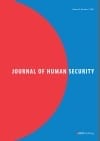
Human Security in East Asia: Embracing Global Norms through Regional Cooperation in Human Trafficking, Labour Migration, and HIV/AIDS
The paper examines the pressing human security issues in East Asia and the scope and form of institutionalization of regional cooperation dealing with these issues. Among the issues to be examined are human trafficking, labour migration, and HIV/AIDS, three of the most challenging human security issues in the region. Of particular interest is the extent to which the countries of the region have embraced the global norms regarding the rights of individuals concerned, including trafficking victims, migrant workers, and persons living with HIV and AIDS patients. Also of concern in this present study are the obstacles to further multilateral cooperation. The article shows that regional cooperation is growing and gradually being institutionalized through such mechanisms as regional consultative dialogues, ASEAN and its various action plans and programs, APEC and its subordinate forums, as well as cooperation with extra-regional parties and global organizations. The study concludes, however, that the human security of border-crossing individuals remains particularly vulnerable in terms of violation of their basic rights.
